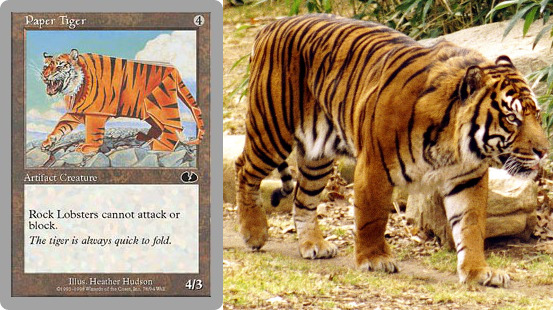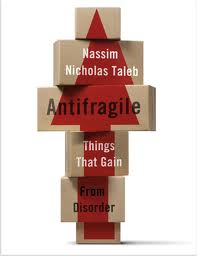Antifragile - Paper tigers, the zombie apocalypse, and fitness
_This is the first post in a series reflecting on ideas contained in the book, Antifragile: Things That Gain from Disorder, by Nassim Nicholas Taleb._
I get so much reading done when I’m forcibly kept away from the interwebs (we just moved into a new place) for any length of time. Maybe I should do that more often? With almost an entire week sans internet I had plenty of time to finish Antifragile. It’s a heavy read, but I enjoyed it immensely and I suspect I will be referencing and re-reading it often. I could write a review, but that wouldn’t be much fun nor that interesting to read. Instead I want to pull out some of the ideas that caught my eye and expand upon them here. Let’s get to it.
Antifragility
Since this is the first post about Antifragile, it makes sense to actually tell you about antifragility first. Maybe I’ll get less blank stares that way. Let’s rewind a bit and talk about two other concepts which we all should actually recognize: fragility and robustness. What’s the primary difference between the two? To use Taleb’s words, fragile things hate volatility and robust things aren’t affected by it. Volatility is overly fancy here though, so I’m just going to refer to volatility as randomness.

How about an analogy? Let’s say we have a paper tiger, like so, and a real (and hungry) tiger. The tinniest nudge from any direction will knock the paper tiger over. The paper tiger doesn’t like any kind of change. Super fragile. Now we have the tiger, he’s not going to budge no matter how much you shove him. All your efforts will just make him angry and more likely turn you into a delicious man-steak. The tiger is unaffected by changes and randomness. That covers things that hate and don’t care about randomness, so to complete the spectrum, what likes randomness (up to a point)? Antifragile things. Taking this tiger analogy way too far: if the paper tiger actually wants you to knock it over (excellent disguise, ninja tiger, most excellent) to catch you unawares as it turns into the real deal then it’s antifragile. Randomness is good and beneficial for antifragile things. In this case the tiger gets man-steaks without needing to chase your ass down first.
Body knowledge (literally)
Okay, maybe you’re not totally getting that weird paper tiger deal. I bet you already understand antifragility, you just didn’t have a name for it. When we build our muscles, what is happening exactly? We damage the muscle and with proper recovery your body not only repairs the damaged tissue, it makes it stronger (usually called supercompensation); that’s a form of antifragility right there. But why does your body decide that it should go beyond repairing the damage to make you even stronger in the first place? Your body, being all smart (and a bit paranoid), knows that what you might face in the future will be worse than what you’ve already dealt with, so it makes you better in preparation for that unknown. Who knows, maybe tomorrow we’ll be dealing with the zombie apocalypse? Romney didn’t get elected, so we still have time to prepare.
Fitness
I think our bodies didn’t get the memo about the new definition of fitness; must have hit the spam box. If the body is getting strong in preparation for an unknown future, then that strength must have a purpose: survival. Yup, so it’s about “survival of the fittest” in a literal sense, rather than the current conventional modern understanding of fitness as some combination of strength, metabolic conditioning, and aesthetic appearance (depends on who you ask). Something’s missing from that definition. I say it’s randomness. You can become better prepared for the unknown by broadening your experience. You’re not going to avoid becoming a zombie hors d’oeuvre by gym training alone (the SAID principle makes sure of that). You gotta be able to adapt and do a whole lot of different things: run, jump, climb, fight, move stuff, maybe even do the zombie shuffle dance to blend in.
The bland and predictable gym environment will only take you so far here. Randomness goes beyond changing up weight, reps, speed, or duration. Stuff such as shape, surface, weather conditions, your own physical and mental state, limitations (e.g., carrying a first-aid kit in one hand), and other things could all impact how effectively you can apply your strength and skill. You can inject some unpredictability into your training by training everywhere. No need to limit yourself to one location (one box, especially) when there’s training and fun to be had anywhere. With a wee bit of creativity and imagination on top of that, it’s even easier to find opportunities.
Embrace a bit of chaos in your training, it’s good for you.
Photo Credit: Wizards of the Coast & Jeff Kubina
Get Updates
Thanks for checking out my site. Play Everywhere is currently being rolled into my newer idea(s) on my new home on the internet, Muimedia. If you like what you've read or watched here head over to Muimedia.com (or click the button) to see my newer writings and sign-up for forthcoming (if TBD) updates.
 Play Everywhere by Sean Rogers is licensed under a Creative Commons Attribution-ShareAlike 4.0 International License.
Play Everywhere by Sean Rogers is licensed under a Creative Commons Attribution-ShareAlike 4.0 International License.
Site design by moi, built with Hugo.

